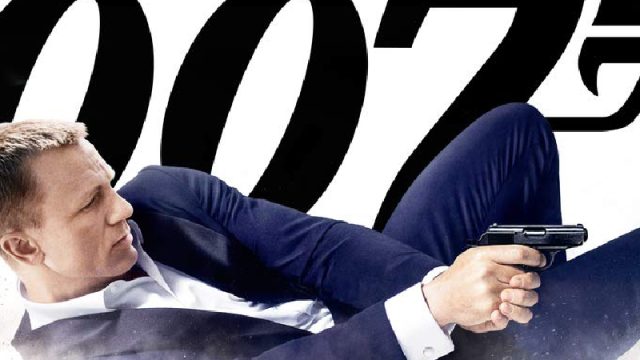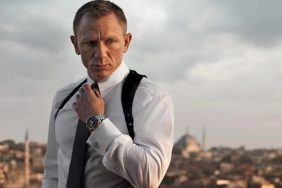It’s almost impossible to determine which James Bond film is the best. Every movie in the decades-spanning franchise has merit — even those featuring Pierce Brosnan surfing CGI waves and crossing swords with Madonna. Still, Skyfall is peak James Bond — and that’s coming from someone who adores the flawless trifecta of Dr. No, From Russia with Love, and Goldfinger. But, of course, it’s not fair to compare Skyfall with earlier entries because it’s not a complete film. Where Sean Connery and Roger Moore essentially played the same stereotypical Bond in each outing, Daniel Craig’s character iteration enjoyed an emotional arc throughout five films.
By Skyfall, Bond had already lost the love of his life, overcome his lust for vengeance, and developed a personal relationship with M. The history established in Casino Royale and Quantum of Solace is vital to understanding the emotional undertones found in Skyfall.
Stir in kick-ass action and an abundance of Christopher Nolan-styled filmmaking, and you have one of the most entertaining films of the last decade. Not convinced? Here are all the reasons why Skyfall stands as one of my favorite James Bond films, in honor of its 10-year anniversary.
Broken Bond
We’ve seen aged Bonds in Never Say Never Again (which may or may not be canon) and the like, but Skyfall is the first film to show what a disgruntled, retired 007 does in his spare time. Answer? Not a lot. After presumably plummeting to his death in the pre-credit sequence, we catch up with a much older Bond living off the grid. He drinks, beds beautiful women, drinks some more, and parties hard. For anyone else, this would be the perfect retirement. But, for Bond, it’s torture.
The man is positively bored. He lacks emotional attachments and has little motivation to do anything but the basics required to keep his heart pumping. Sans his 007 status, Bond has no purpose.
By the film’s end, however, Bond regains his lust for life, primarily due to the personal connection he forms with M throughout the story. As such, the climax is less about stopping the bad guy and completing the mission and more about protecting Mv — a fascinating bit of character growth that packs Skyfall with an enormous emotional punch.
Judi Dench
Academy Award-winning actress Judi Dench first appeared in the Bond franchise in 1995’s Goldeneye. While she was terrific in the role, none of the subsequent Brosnan films had any idea what to do with her. Thankfully, in the Craig saga, the filmmakers took advantage of her unbelievable acting talents and expanded her relationship with 007 from a beleaguered boss to something akin to a mother figure.
Skyfall takes Bond and M’s relationship one step further and makes M the de facto Bond girl of the film. Our boy flirts with Moneypenny (Naomie Harris) and sleeps with Bérénice Marlohe. Still, otherwise, he spends most of the movie by M’s side, dutifully protecting her from harm.
The third act revolves around Bond rescuing his boss from the villain Silva (Javier Bardem). This plot beat buries the third act under a thick layer of sentiment.
Dench is the MVP of the picture and probably deserves more love for her performance than she received.
Home Alone
As mentioned above, Skyfall’s finale involves Bond protecting M from Silva’s wrath. To do so, our heroes head out to a massive mansion in the Scottish Highlands, where Bond grew up. Our blond 007 sets up a series of elaborate traps to stop an army of pesky villains from breaking into his home, then screams in front of a mirror when he accidentally applies too much aftershave.
Yeah, it’s basically Home Alone sans the pump-action BB shotgun and goofy pratfalls, but that doesn’t make the sequence any less awesome. In fact, it’s probably one of the better James Bond finales, despite the relatively small stakes. There’s no global threat, no bomb to diffuse, and no evil henchmen. Bond needs to protect M. That’s it, and damn it if our roguish hero doesn’t decimate an entire army completing his mission.
Things Go Boom!
Skyfall is a much more personal James Bond outing, but that doesn’t keep director Sam Mendes from blowing s— up really good. Bond destroys a train with a tractor, nearly gets run over by a runaway subway train, and then says, “F— it,” and blows up his childhood home. The set pieces are immense, but Mendes and writers Neal Purvis, Robert Wade, and John Logan ensure the spectacle is consistent with the characters and story.
Roger Deakins
We can debate this one if you’d like, but you’d be hard-pressed to find anyone who doesn’t think Skyfall is the best-looking James Bond film in the franchise. Roger Deakins’ stunning cinematography captures the neon-lit mystery of Shanghai, Macau’s tropical beauty, and the Scottish Highlands’ bitter cold. It’s incredible to behold, especially in 4K.
The Music
Skyfall also boasts one of the best soundtracks of the franchise thanks to Thomas Newman’s wonderfully fresh, hypnotic, and atmospheric score — and British singer-songwriter Adele’s opening song. I can describe these elements, or you can watch them in the video below.
Silva
The hero is only as good as his villain, as the old adage goes. In this case, Javier Bardem’s embittered former MI6 operative ranks among the best of the franchise. He may be more Joker than Jaws, but he pushes Bond to his absolute limits, physically and emotionally, despite relatively minor screentime. No, his plot to assassinate M doesn’t make sense, but when does anything about a James Bond film make sense?
Rebirth and Reset
In Skyfall, James Bond literally rises from the dead to aid MI6 in its quest to stop Silva’s brand of cyberterrorism. Bond dies (figuratively speaking) during the pre-credits sequence and is resurrected as a shadow of his former self — he’s a borderline alcoholic who can’t even do pullups! Tsk.
Following his long journey, Bond burns down his past and rises from the ashes to begin anew.
No, really. At the end of Skyfall, Bond returns to a familiar-looking MI6, one more in line with the agency seen throughout the Sean Connery era (bulletproof door and all!) than the suped-up offices inhabited by Brosnan. In other words: our hero destroys his past to move forward, except he also moves backward … get it?
Bond’s journey is cathartic, emotional, and undeniably powerful. That’s why it’s one of the best James Bond films ever put to screen.









